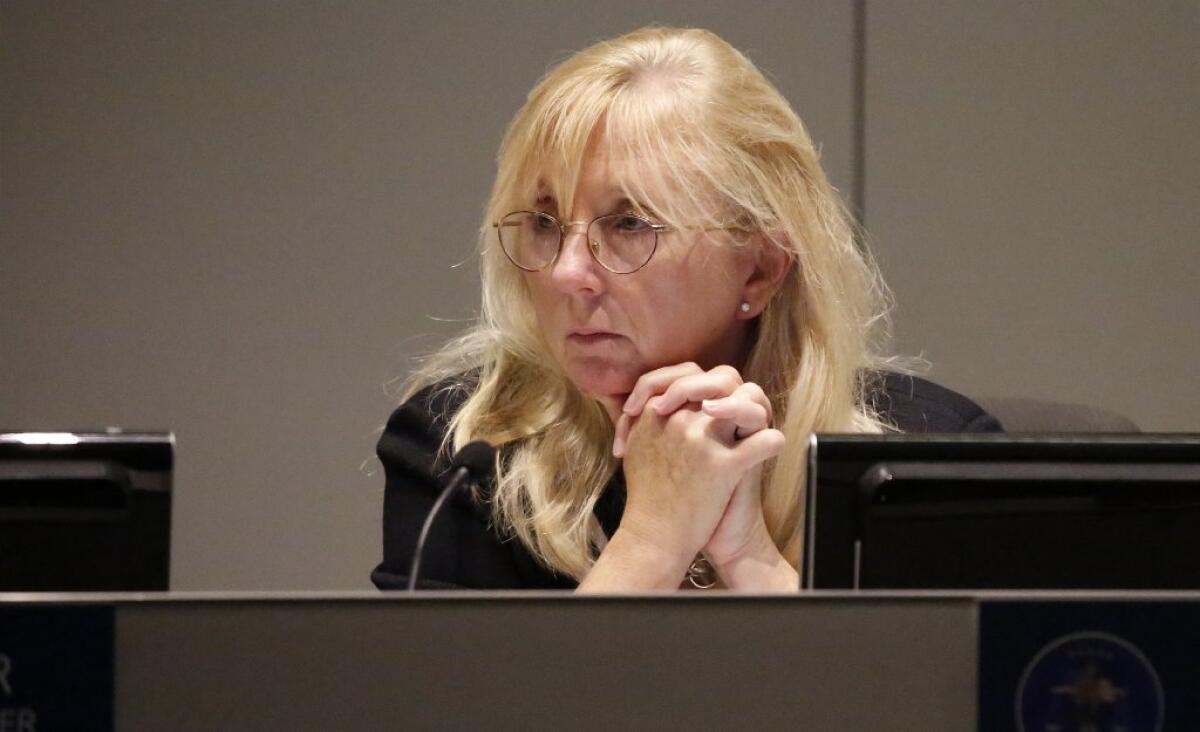Police reform advocates demand LAPD stop using CalGang database

- Share via
Police reform advocates on Tuesday demanded the Los Angeles Police Department stop using a statewide database for identifying and tracking gang members, arguing it has undermined public safety and derailed the lives of innocent people.
The advocates told members of the Los Angeles Police Commission that they are not only concerned with the allegations of overt abuses of the CalGang database by officers, but with the system overall. Even when operating as intended, they said, the database too often places incorrect and life-altering labels on young men of color based on little more than their clothing, their tattoos and the neighborhoods they live in.
“We need to divest in suppression policing, and instead invest in youth development,” said Anthony Robles of the Youth Justice Coalition, who said he experienced police harassment growing up after being misidentified as a gang member.
Melanie Ochoa, a staff attorney with the American Civil Liberties Union of Southern California, said the database “cannot just be fixed with some tweaks and additional oversight,” because the problems are systemic and officers are misidentifying people routinely.
“All the evidence we have is that LAPD officers are actually very bad at this, and very often incorrect,” she said.
The comments came during the first of several meetings intended to collect public input on the matter after years of controversy and amid several reviews of the database’s use within the LAPD, including by the department, Atty. Gen. Xavier Becerra and the California Department of Justice.
The California Legislature gave oversight of CalGang to the attorney general in 2018 after an audit found it lacked proper state oversight and contained questionable records. Thousands of records were purged from the database as a result, but thousands more have been added since — many of them by LAPD officers.
Earlier this year, the department said as many as 20 officers from the LAPD’s Metropolitan Division were being investigated for falsifying interview cards from traffic stops and entering incorrect information into the database to make it seem as if they were doing a better job collecting intel.
Police officials have condemned abuses of the system but defended it as a valuable crime-fighting tool.
Police Commission President Eileen Decker said Tuesday that she and other commissioners had grave concerns about abuses of the system, and welcomed input from the advocates on what should be done to end those abuses and improve the program.
A few advocates said an immediate moratorium on adding any new names to the database should be adopted until the department can get a better grasp on how best to operate it appropriately. But most of the advocates said the database should be scrapped entirely.
Several shared personal stories about how it had negatively affected their lives.
Michael Saavedra, legal coordinator for the Youth Justice Coalition, said he was formerly incarcerated and haunted for years by his designation as a gang member. He was recently accepted to UC Berkeley but still feels the shadow of that designation.
“For folks like me who have done their time and are trying to change their life, this label, this stigma, stays with you forever,” he said.
Demetra Johnson, with PUSH L.A., said her son was put into the database when he was 17 years old despite never having come into contact with police except as a police cadet, and it took her two months of collecting letters from his teachers and counselors, and taking him to a police station to prove he didn’t have any gang-related tattoos, to get the police to remove his name.
“During those 60 days when he was on there, I was just terrified,” she said.
Ochoa, of the ACLU, said police try to downplay the importance of the gang database, even though they know that putting a person’s name into it, and thereby sharing the assertion that they are gang affiliated with an array of other law enforcement agencies across the country, can have devastating effects.
“That label alone can cost them their housing, their employment, their right to remain in the United States, their freedom and their life,” she said.
Several commissioners said they believe change is needed, but are evaluating the database one step at a time. They still have to hear back from the Police Department on its investigation into the alleged abuses, and look at the results from a separate audit of the program in all of the department’s divisions, before making any decisions on how to change it.
Commissioner Shane Murphy Goldsmith said the people who testified provided valuable insight into the detrimental effects of labeling people as threats, both for them and the broader community.
“There are people behind these labels,” she said, “and extraordinary people who are held back by these labels.”
More to Read
Sign up for Essential California
The most important California stories and recommendations in your inbox every morning.
You may occasionally receive promotional content from the Los Angeles Times.














